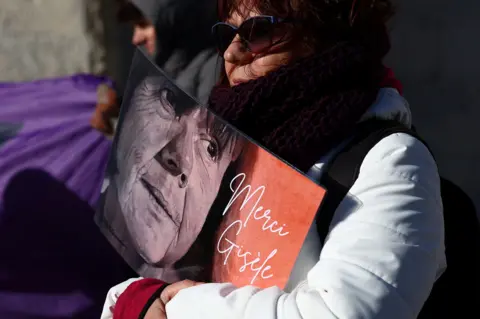French rape survivor Gisèle Pelicot walked out of a court in southern France for the last time on Thursday after her ex-husband was jailed for 20 years for drugging and raping her, and inviting dozens of strangers to also abuse her over nearly a decade.
Dominique Pelicot, 72, was found guilty of all charges by a judge in Avignon. He was on trial with 50 other men, all of whom were found guilty of at least one charge, although their jail terms were less than what prosecutors had demanded.
Although the trial is over, there are still questions lingering over the Pelicot case and what happens next.
1. What will Gisèle Pelicot do now?
When she climbed the steps of the Avignon courthouse for the first time in September, no one knew Gisèle Pelicot’s name. Over the course of the next 15 weeks, her fame as a rape victim who refused to be ashamed of what had been done to her grew vertiginously.
By the time she left the tribunal on Thursday, crowds of hundreds were chanting her name and her picture was on the front pages of newspapers worldwide.
She is now perhaps one of the best-known women in France. This means that although she has changed her name, it will be impossible for her to return to the anonymity that served her so well as she tried to rebuild a life following the revelation of her husband’s crimes.
Gisèle is not the first person whose unimaginable suffering has turned her into an icon. At great personal cost, she has become the symbol of a fight she never chose. It seems unlikely, then, that she will want to become an outspoken activist against gender violence, or a prominent feminist figure. Rather, she may go back to what she has said has always given her solace: music, long walks and chocolate – as well as her seven grandchildren.
“At the start of the trial she said: ‘If I last two weeks, that will be a lot.’ In the end, she made it to three and a half months,” her lawyer Stephane Babonneau said. “Now, she is at peace, and relieved it’s all over.”
2. What really happened to Caroline?
Days after Dominique Pelicot’s crimes came to light, his daughter Caroline Darian was summoned to the police station and shown photos of an apparently unconscious woman dressed in unfamiliar lingerie. Later, she said her life had “stopped” when she realised she was looking at photos of herself.
Her father has always denied touching her, but Caroline – whose anguish and devastation were apparent in many court sessions – has said she would never believe him and accused him of looking at her “with incestuous eyes”.
But the lack of proof of the abuse Caroline is convinced was inflicted on her has led her to say she is “the forgotten victim” of the trial. That notion has visibly seeped into her relationship with her mother. In her memoir – published after her father’s arrest – she accused Gisèle of not showing her enough support, implicitly choosing to side with her rapist ex-husband over her daughter.
Although Gisèle and her children have always sat next to one another in court, often whispering huddled together, there have been signs of the toll the trial has taken on their relationship.
On Friday, Caroline’s brother David highlighted – as he has done before – that the trial had not just been about Gisèle but about their whole “annihilated family”.
“Us children felt forgotten,” he said. “Very honestly I feel that while our lawyers did a remarkable job on the defence of our mother, we were a little bit less taken into account.”
In her memoir, Caroline lamented Gisèle’s “denial as a coping mechanism”.
“Because of my father,” she wrote, “I am now losing my mother.”
3. How many defendants will appeal?
Apart from Dominique, all of the jail terms handed down to the defendants were less than what prosecutors had demanded.
Several defence lawyers were visibly satisfied, meaning it is unlikely they will encourage their clients to appeal against their sentences. A man called Jean-Pierre Maréchal got 12 years – five less than prosecutors had asked – and his lawyer Patrick Gontard told the BBC it was “out of the question” he would appeal.
 Getty Images
Getty ImagesThe months or years the men spent in pre-trial detention will count towards their total sentences, meaning that some may be freed soon if they have served their minimum term.
One man who was facing 17 years ended up being sentenced to eight years’ imprisonment, and his lawyer Roland Marmillot told the BBC that because he had already spent several years in jail it was likely he would be released relatively soon.
Still, by the morning after the trial closed, two men each jailed for eight years had already appealed. More are expected to follow over the next ten days – the period of time appeals can be lodged for.
4. What else could Dominique Pelicot be guilty of?
Dominique Pelicot has admitted to assaulting and attempting to rape a 23-year-old estate agent, known by the pseudonym Marion, in the suburbs of Paris in 1999. A cloth imbued with ether was put over her mouth but she managed to fight the attacker off and he fled. It was only in 2021, after he was arrested for the crimes he inflicted on his wife Gisèle, that Pelicot’s DNA was cross-checked with a speck of blood found on Marion’s shoe, and he admitted to his guilt.
He has, however, denied any responsibility in another cold case – the 1991 rape and murder of another young estate agent, Sophie Narme, for which there is no DNA. Investigators have argued that the two cases present too many similarities to be coincidental.
Other cold cases where similar modi operandi were used are also being looked at again.
5. Will the trial be a turning point?
“There will be a ‘before’ and there will be an ‘after’ the Pelicot trial,” one Parisian man told the BBC in the early days of the trial.
For many, this sentiment has only grown over the last few months during which the intense media coverage of the Pelicot trial generated countless conversations around rape, consent and gender violence.
“What we need to do is have much, much harsher sentences,” Nicolas and Mehdi, two Mazan residents, told the BBC. They said they were “disgusted” when they found out one of the defendants was a man they had played football with.
“With longer sentences they’ll at least they’ll think twice before doing stuff like this,” they said, adding that it was “crazy unfair” that some of the men could come out of jail in the next few months.
 Reuters
ReutersIt is worth noting, however, that the risk of incurring a 20-year prison sentence for aggravated rape did not deter Dominique Pelicot from offering his unconscious wife to be raped by strangers he met online.
There have been calls to reform French legislation on rape to include consent, but that has stalled in the past and would take considerable work in the current divided French parliament.
Some have argued that schools have a responsibility to better teach new generations about sex, love and consent. Béatrice Zavarro, Dominique Pelicot’s lawyer, has said she believes “change will not come from the Ministry of Justice but from the Ministry of Education.”
 EPA
EPAFrançoise, a resident of the area where Gisèle and Dominique Pelicot used to live, told the BBC she thinks a way must be found to bridge the gap between what children are taught in schools and the type of material they have access to online.
“Young people are so exposed to sex on the internet and at the same time schools are very prudish,” she said. “They should be much more open and frank to match and explain what kids see.”
What these exchanges show is that, while it will take time before any changes become tangible, a conversation has now started. It will continue until there are no more unanswered questions.


Leave a Reply